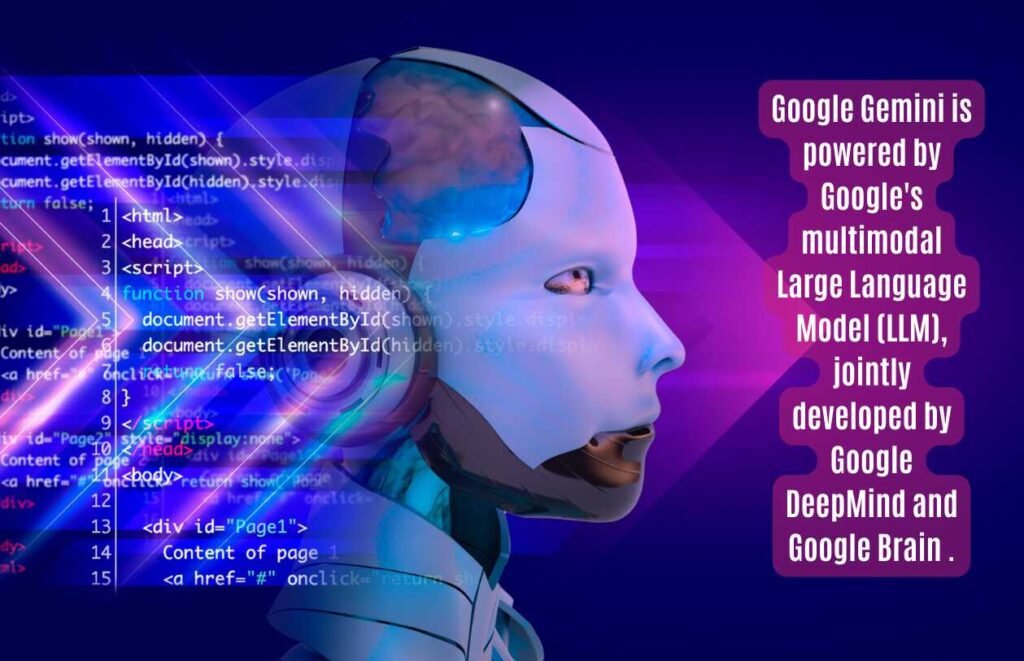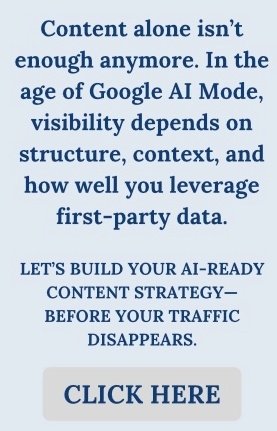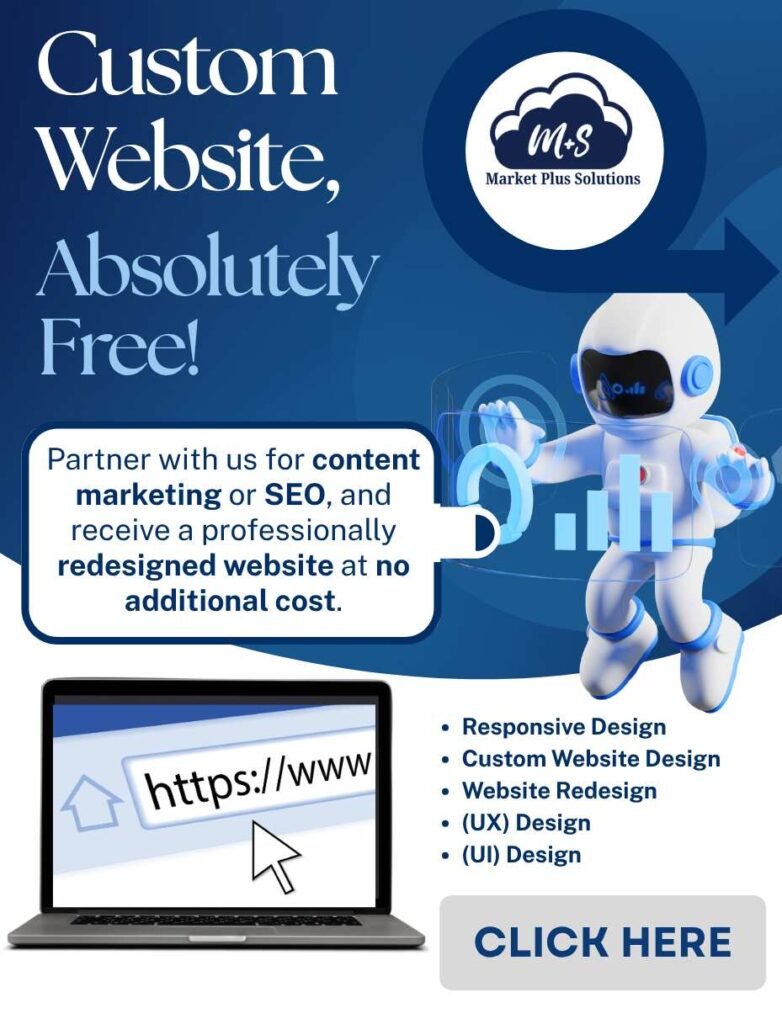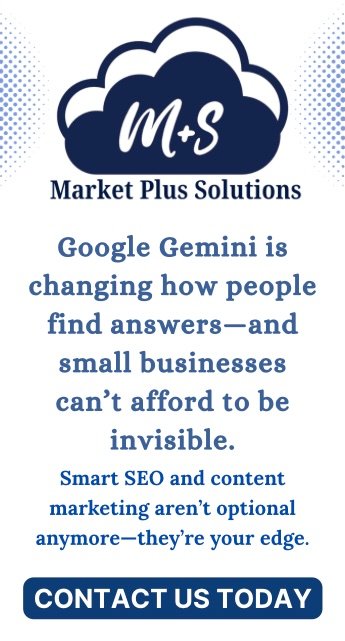Is Google AI Mode Is Quietly Rewriting the Internet?
Google AI Mode—have you heard of it? And more importantly, have you noticed changes in your traffic lately?
About four weeks ago, we noticed something strange on Google Analytics.
Our organic traffic started to slip. Nothing major at first — a 12% drop. Then 20%. Then 34%.
We ran the usual checks:
Rankings? Stable.
Page speed? Excellent.
Core Web Vitals? All green.
Backlinks? Better than ever.
By all metrics, we should’ve been climbing. But the numbers told a different story.
Then came the headline:
“Google AI Mode is now live for all U.S. users.” — BBC Future, June 11, 2025
That’s when it clicked.
Google didn’t just roll out a feature. It launched an entirely new search experience — Google AI Search — powered by Gemini.
Instead of showing users a list of results, it now delivers AI Overviews: machine-generated summaries built from your content and others like it. No links. No clicks. No opportunity for users to engage with your site.
If you’re a small business that relies on organic visibility to drive growth, this isn’t just disruptive — it’s existential.
You’re not losing rankings.
You’re losing attention.
And in today’s search economy, that’s everything.

What Google AI Mode Really Is (And Why It’s a Threat)
Google AI Mode isn’t just an interface update — it’s the most radical change to search since Google began (securityinfowatch).
Powered by the Gemini model, this new experience doesn’t serve up a list of links. It gives users fully-formed answers right on the results page. No scrolling. No clicking. No need to visit your website at all.
At the center of this shift are AI Overviews — machine-written summaries stitched together from web content (click here to explore our content marketing agency page). Ask a question, and Google AI Search responds instantly, pulling key insights from multiple sources. It’s like a chatbot and a search engine had a baby — and that baby now controls the front door to the internet.
For users? It’s seamless.
For small businesses? It’s dangerous.
Because when Google gives users everything upfront, your content doesn’t earn the click.
Your product pages, guides, blogs — they become background material for AI-generated answers in search. You still do the work. You just don’t get the visit. This isn’t just about rankings anymore. It’s about access. And when Google decides who gets seen and who gets stripped for parts, that’s not an algorithm tweak.
That’s a power shift.
Why Small Businesses Should Be Paying Attention — Now
If your business depends on organic search traffic—even a little—this isn’t just noise. Google AI Mode is a seismic shift in how people discover, trust, and engage with information online. It doesn’t just change how search looks. It changes who gets seen.
Here’s how it works: AI Overviews pull from websites like yours, summarize the content using Gemini-powered search, and serve the answer right there in the results. The user gets what they need instantly.
No click.
No visit.
No conversion.
And the consequences are already here.
Some sites are reporting click-through rate drops of 30–70%, a trend driving what many are calling the organic traffic decline of 2025.
Even large publishers like HouseFresh and The Washington Post are taking massive hits (Source: NY Post, June 2025).
So if they’re losing visibility?
Small businesses are getting crushed.
You’re not being outranked—you’re being replaced.
Your content still shows up, but it no longer earns attention (Click here t explore our content marketing services for SaaS and IT Businesses)
And in this new reality, that changes everything about how SEO works—from strategy to survival.
This Isn’t a Feature. It’s a Redefinition of Search.
This isn’t some hidden toggle in Search Labs anymore.
As of June 2025, Google AI Mode is the default search experience for all U.S. users—including incognito. Millions of people are now interacting with an entirely new Google, often without realizing it (Financial Times).
This is the Google Search update of 2025—and it’s already rewriting how information flows across the internet. No more ten blue links.
No more click-through journeys.
AI Mode introduces an integrated chatbot experience—signaling a fundamental shift in how users interact with the web’s most popular search engine (The Verge)
Instead, users see a full, AI-generated answer at the top of the page, stitched together by Gemini-powered search and served without context.
For small businesses, this is a game-changing shift.
The old rules—where quality content, smart SEO, and consistency could level the playing field—no longer apply. If your content doesn’t get pulled into the AI Overviews, you don’t exist (Click here to check out our SEO Services for Small Business)
And if it does?
You’re often reduced to a citation, not a destination.
This isn’t a redesign. It’s a redistribution of visibility—and it’s happening in real time.
Search Console Just Got an AI Upgrade
While most of the spotlight has been on the front end of Google AI Mode, one of the most important changes happened quietly in the background. In a low-key but critical update, Google expanded its reporting tools to include data tied directly to AI Overviews (Search Engine Journal).
Inside Search Console, you can now track how your content performs in this new AI-first world. That means access to:
- Clicks generated from AI-generated answers in search
- Impressions your content receives within Google AI Search
- Your average position inside Gemini-powered summaries
This new layer of Search Console AI data confirms what many content creators suspected: your work is still being used—but it may not be bringing in traffic. And for small businesses, that’s a real problem. Because let’s be honest—visibility without clicks doesn’t pay the bills.
More importantly, these metrics represent something bigger: Google is officially acknowledging that its AI isn’t pulling knowledge from the ether. It’s pulling from you. From content you’ve researched, written, and published.
The difference now? You can measure it.
The question is—will you adapt before it’s too late.
AI-Generated Answers Are Replacing You
Here’s the uncomfortable truth: your blog might still rank—but your audience may never see it.
In the new Google AI Search experience, your content doesn’t get showcased.
It gets repurposed.
Google’s Gemini-powered search extracts snippets, quotes, and context from your pages and rewrites them into a machine-curated response—delivered instantly in an AI Overview.
No clicks. No scroll. No engagement.
Just a stripped-down, context-free version of your work, served up without attribution that matters.
That’s the real Google AI Mode traffic impact.
You’re not being outranked. You’re being absorbed.
Your insights become input for a chatbot.
Your tone—gone.
Your CTAs—cut.
Your funnel—disconnected. What’s left is content without conversion.
And for small businesses, this shift is brutal. You’re not just losing organic traffic. You’re losing leads, authority, and the power to shape how your brand is experienced. You’re not in control of the journey anymore—Google is.
The cost of invisibility has never been higher.
The Future of SEO With AI Isn’t Search. It’s Selection.
If your SEO strategy still relies on keywords, backlinks, and meta tags—you’re already behind. The old playbook isn’t broken. It’s obsolete. And Google AI Mode is accelerating the shift (Check out our SEO Services for SaaS and IT Businesses).
In this new landscape, visibility isn’t about ranking—it’s about selection. And that selection happens inside AI Overviews, not the top of page one.
The future of SEO with AI is built on structure, clarity, and credibility.
Your content needs to be easily quotable—precise, well-formatted, and fact-rich—because Google’s Gemini-powered search isn’t just crawling your content.
It’s curating it.
But even perfect structure won’t save you if Google doesn’t trust your brand. AI-generated answers in search prioritize authoritative voices.
And for small businesses, that’s a double-edged sword. You might not have the domain authority of an enterprise, but if you’re consistent, credible, and useful—you can still earn your way into the summary.
This is no longer a game of who gets the most traffic. It’s about who gets selected to speak on the user’s behalf.
Getting to Page One isn’t the goal anymore.
Getting into the answer is.
How to Stay Visible in a Gemini-Powered Search
The rules have changed—but small businesses aren’t out of the game.
You just need a strategy that matches the terrain. And in a world shaped by Gemini-powered search, visibility is earned differently.
1. Track the right signals.
Start by looking at your performance inside Google AI Mode using the new Search Console AI data. You’ll see if your content is getting cited in AI Overviews—even if it’s not driving clicks.
And if that’s the case? Don’t panic. Rethink. Adjust your funnel. Strengthen your CTAs. Make sure every piece of indirect visibility has a path to lead generation.
2. Write for humans. Format for machines.
Your content needs to be structured like it was made for AI—because it is.
Use clean subheadings, bullet points, and clear logic that Google AI Search can quickly parse. But don’t sacrifice your voice. Let the structure serve the algorithm. Let the tone speak to the people.
3. Don’t build on rented land.
If your entire growth engine relies on organic search, you’re exposed.
Diversify your distribution: grow your email list, own your traffic, embed yourself in trusted communities. You don’t want to be dependent on the next Google search update to stay alive.
For small businesses that rely on Google to bring in customers, AI Mode threatens to cut them off from the top of the funnel entirely
(Business Insider)
4. Build credibility. Earn citations.
In this new model, Google doesn’t just crawl content.
It selects sources. If you’re not consistently publishing useful, trustworthy, authority-first content, you’ll be invisible in AI-generated answers in search. This isn’t about volume. It’s about being the brand Google trusts to speak on a topic.
In short: structure smart, speak clearly, publish with authority—and stop playing a game built for someone else’s algorithm.
This Is a Turning Point — Act Accordingly
Google AI Mode isn’t just another update—it’s a signal that the rules of search have changed for good.
The new model rewards content that’s structured for machines, trusted by the algorithm, and selected for AI Overviews.
And in this new system, small businesses—without strong authority signals—are the ones most at risk of being erased from the conversation.
But here’s the good news: you’re not powerless.
You can still win—if you understand how AI Mode affects SEO and make the right moves early.
That starts with shifting your mindset. It’s no longer about rankings and clicks alone. It’s about citations, clarity, and credibility. It’s about using tools like Search Console AI data not just to monitor traffic—but to track visibility inside the AI layer.
No, this isn’t the end of SEO.
But it is the end of SEO as we knew it.
We’ve entered a hybrid search era—one where Google decides not just what ranks, but what gets read. And the businesses that thrive will be the ones who know how to write for both audience and algorithm, with a voice that cuts through the noise.
So if you’re a small business, this is your moment.
To rethink your content.
Retool your strategy.
And reassert your voice—before the algorithm filters it out for good.
Want to stay visible in an AI-first search landscape?
At Market Plus Solutions, we help SaaS and IT companies future-proof their content strategies — including how to adapt to Google AI Mode and maintain visibility in a changing search world. Let’s talk!




